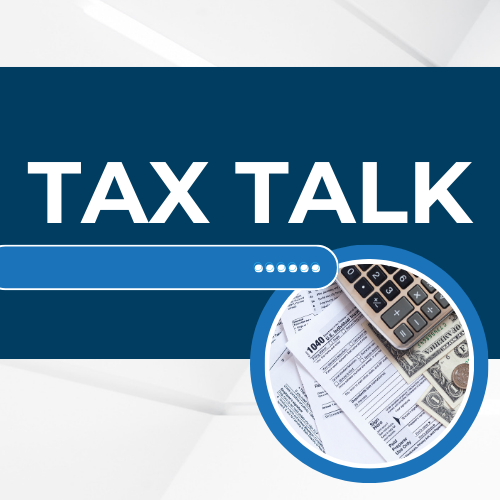May 2024 Newsletter
May 2024 Newsletter

National Small Business Week (April 28 - May 4, 2024) recognizes the hard work, dedication, and ingenuity of entrepreneurs and small business owners all across the nation. We're celebrating by sharing some of our most valuable tax tips for self-employed/small business owners:
Make Estimated Tax Payments throughout the year if you don't have taxes withheld and paid from your paycheck. Income tax is a pay-as-you-go tax and most people have tax withheld by their payroll provider. If you're a small business owner, you may not have that luxury! Making estimated tax payments (also known as quarterly tax payments) to both the IRS and State will prevent them from charging the penalty for underpaying estimated tax payments, and also may be easier to budget throughout the year instead of paying a large bill at tax time.
Understand how to classify the people who do work for you as either employees or contractors. An employee is generally considered anyone who performs services, if the business can control what will be done and how it will be done. What matters is that the business has the right to control the details of how the worker's services are performed. Independent contractors are normally people in an independent trade, business or profession in which they offer their services to the public.
Maintaining separate books and bank accounts for your business will not only help you keep track of your expenses, but can be a vital shield during an audit or lawsuit. Accountants call this the "corporate veil", meaning that you aren't comingling personal and business funds, or comingling funds between businesses. It shows you recognize each company is its own distinct entity. This will help protect your personal assets and funds in case of an audit or lawsuit, as well. We've seen cases where an IRS auditor classifies all expenses in a business bank account as "personal" because the client ultimately couldn't determine which ones were actually for the business.
Determine your industry's sales tax requirements: Not every business is required to collect sales tax, but neglecting to do so can cause huge issues with Minnesota Department of Revenue. A helpful tool for determining your filing requirements is the Minnesota Department of Revenue website, where the Department offers webinars and other helpful resources for small business owners.
Be sure to discuss these and other tax tips with your tax professional.
Interested in hearing more? Or have ideas of your own? We'd love to hear them!
Plant the Seeds for a Successful Year
Your business is a lot like a garden. If you tend to it throughout the year, you're much more likely to have a successful and low-tax year than if you wait until the last minute. Here are just a few ideas and processes to implement during the year that may help you save time and set you up for a successful year:
- Track your Mileage throughout the Year: You can use a phone app, or mileage log, to do this. Mileage really does add up to a significant expense! For 2024 the mileage deduction is 67 cents per mile.
- Accounting Methods: Choose between cash and accrual accounting methods. Depending on your business's size and industry, one method may be more advantageous for tax purposes.
- Data-Driven Decision Making: Modern inventory management systems provide small businesses with valuable data insights and cash flow management. By analyzing sales trends, stock turnover rates, and customer preferences, businesses can make informed decisions about purchasing, pricing, and marketing strategies. This data-driven approach empowers small businesses to adapt to market dynamics, capitalize on opportunities, and make strategic adjustments to inventory levels
- Stay on Top of your Bookkeeping: We'd advise using a bookkeeping software, outsourcing your bookkeeping to a professional, or at the very least an Excel spreadsheet, to keep track of money coming in and out of your business. It's much easier to categorize expenses and income throughout the year than it is to go back and try to recreate your records at tax time.
- Contribute to Retirement and Health Savings Accounts: Not only are these great for financial planning, but the amounts that you contribute can lower your tax bill! If your small business offers a retirement plan with an employer match, your contributions can lead to even greater tax benefits. Matching contributions are tax-deductible for your business, and they help attract and retain top talent while providing a powerful incentive for employees to save for their own retirement. The contributions you make on behalf of your employees can enhance your business's overall compensation package.
- Document Your Donations: Small businesses are the backbone of the community and often donate generously to charitable and other non-profit causes. However, proper documentation is essential when claiming charitable donations as a business expense. Keep thorough records of your contributions, including receipts, acknowledgment letters from the recipient organization, and a detailed description of the donation's purpose and relevance to your business. This documentation is crucial when reporting deductions on your business tax return.
- Utilize Payroll Software: Yes, you can do payroll yourself, but utilizing a payroll software will save you time and stress by helping you pay employees, calculate the taxes, and file quarterly payroll returns. Some payroll products even do these all automatically.
- Choose the Right Business Structure: The choice of entity (e.g., sole proprietorship, partnership, LLC, S corporation, or C corporation) can significantly impact your tax liability. Consult with a tax professional to determine the most tax-efficient structure for your business.
Referral Corner
Every month we put the spotlight on another local business. This month we're featuring:
Debra Miller, with Miller-Wander Home Group and Keller Williams Classic Realty
Tell us a little bit about yourself!
With over 35 years of experience, our real estate business has been built on one important principle: building exceptional relationships with you, our client. Our entire focus is on your complete satisfaction. Maybe that's why more than 75 percent of our business comes from repeat customers and referrals.
What is your specialty and who do you help?
Anyone looking to buy or sell in the state of Minnesota, with referral partners anywhere in the world.
What is a fun fact about your industry that we might not know?
It's a people business and we get to meet and help all different phases of home ownership.
What is the best way to reach you to get started?
Text or Call me at 612-735-9839, or Email at debra@mwhomegroup.com
What do you do when you're not working?
I now have 8 grandchildren and focus my off time to family, friends, and volunteer work.
Quick Links
Contact Information
Business Hours
- Mon - Fri
- -
- Sat - Sun
- Closed















